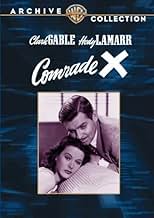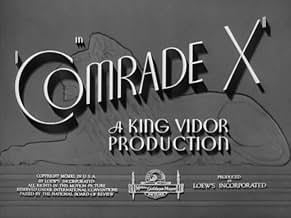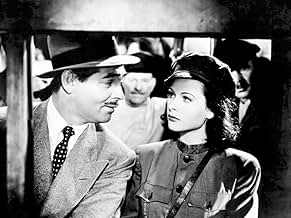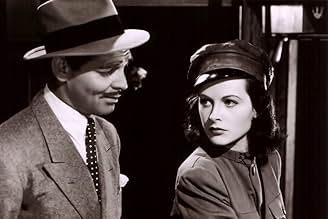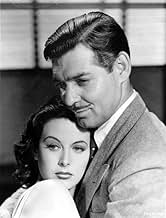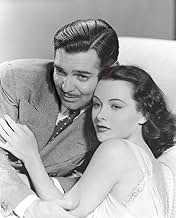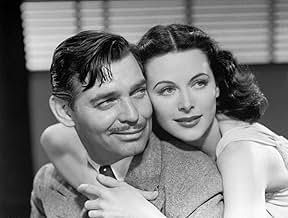NOTE IMDb
6,6/10
1,9 k
MA NOTE
Ajouter une intrigue dans votre langueAn American reporter smuggling news out of Soviet Moscow is blackmailed into helping a beautiful Communist leave the country.An American reporter smuggling news out of Soviet Moscow is blackmailed into helping a beautiful Communist leave the country.An American reporter smuggling news out of Soviet Moscow is blackmailed into helping a beautiful Communist leave the country.
- Réalisation
- Scénario
- Casting principal
- Nommé pour 1 Oscar
- 1 nomination au total
Sig Ruman
- Emil Von Hofer
- (as Sig Rumann)
Georges Renavent
- Laszlo
- (as George Renevant)
Ed Agresti
- Press Correspondent
- (non crédité)
Alexander Asro
- Russian Waiter
- (non crédité)
William Bailey
- Press Correspondent
- (non crédité)
Al Bain
- Marriage Bureau Customer
- (non crédité)
Lici Balla
- Russian Woman
- (non crédité)
Leon Belasco
- Comrade Baronoff - Hotel Manager
- (non crédité)
John Bleifer
- Russian Marriage License Clerk
- (non crédité)
- …
Avis à la une
In the days when actresses had genuine accents that put a lilt in their speech, Hedy Lamarr, like Greta Garbo and Ingrid Bergman, had refinement and intelligence, and could portray "foreigners" from any number of countries. Here, Hedy is supposed to be Russian, and with a light touch, too. She makes a charming foil to beefy Clark Gable, who plays his usual role as the macho-male with a wink in his eye covering a heart of gold. Their chemistry is not quite as magical as that in "It Happened One Night," with Claudette Colbert (who had the softer edge and mysterious sex appeal that truly complemented Gable's), or even his pairings with the brassy blonde with the Brooklyn accent, but there are a number of scenes in this farce that I have not seen equalled elsewhere: namely the escape scene in the Soviet tank. Before the age of graphic simulation, the prop men really had to come up with a phalanx of Soviet-style tanks -- unless they used miniatures, and to see them "chase" Gable, with Hedy at the wheel, is almost on a par with a Chaplin or Keaton routine. The miming of the Soviet tank army is also hilarious.
Ernst Lubtisch's classic comic statement about Communist Russia, NINOTCHKA, came out in 1939. Whether it "influenced" the production (also by MGM) of COMRADE X or not I could not say. Certainly there are similarities between the comedies. Lubitsch set his comedy in Paris, where a Communist trade mission is living it up, being corrupted by an émigré Russian noble (Melvin Douglas) so he can try to retrieve jewelry that the trade mission is using as collateral. The Russian government does not trust the three men sent, so they send a fiercer ideologue (Greta Garbo in the title role) who starts straightening out the mission, until she falls for Douglas's charm. In the end she is lured back (with her three associates) to the west and away from the Soviet paradise.
NINOTCHKA had Felix Bressart and Sig Ruman in the cast as two of the members of the trade mission. Comments on this thread point out that in the 1930s "accents" were fairly interchangeable in Hollywood, so that the Swedish Garbo (and later the Austrian Lamarr) became Russian. So did German Ruman and German - Jewish Bressart (who would also play a Hungarian in THE SHOP AROUND THE CORNER).
Unlike NINOTCHKA, COMRADE X is set inside that nightmare land, Stalinist Russia. Somebody is sending out unofficial (but thoroughly correct) news stories showing the crimes being committed in Russian by the government against the people (i.e. the purges), as well as the idiotic projects and waste mismanagement illustrative of how poorly the government is as effective government. This is being resented by the Presidium, who is represented by Oscar Homlolka (Commissar Vasiliev). Please note that Homolka's make-up makes him look a tremendous bit like one Joseph Stalin. At a public funeral covered by the press court, someone tries to shoot Vasiliev (who does all he can to hide the assassination plot). Mac Thompson (Clark Gable), the American reporter, manages to snap a photo of an odd site - a bearded man who a moment before the shooting opened up the lid of the coffin and popped out. This bearded gentlemen turns out to be one Michael Bastakoff (Vladimir Sokoloff), a rival of Vasiliev for power. He is made to look a tremendous bit like one Leon Trotsky.
Get the message from Hollywood here? Vasiliev's agents have been trying to pin down the news leaks, and has narrowed it to two figures: Thompson, and one Emil Von Hofer (Sig Ruman) who is the news representative from Nazi Germany. Ruman manages to demonstrate it ain't him, so (despite Gable's breezy denials) Vasiliev believes it is the American.
Gable has a close friend in Moscow, one Ygor Yahupitz (Felix Bressart) who is his sometimes valet. Ygor's daughter is Galubcha (Hedy Lamarr) who is a streetcar operator. Ygor wants Gable to try to smuggle Galubcha out of the Soviet Union into the U.S. And the film shows (among other things, including overcoming Galubcha's fierce belief in the Communist ideal) Gable eventually saving both the girl and her father.
The comedy is quite amusing, even if it lacks the style and grace of the Lubitsch touch of the first film. But it certainly comments on the atmosphere within Russia in a way that NINOTCHKA failed to do so. The centering of the comedy in Moscow, the suggestiveness of a Stalin - Trotsky rivalry clone, and the heavy control over information is certainly more realistic than Douglas' being elegant and eloquent about the beauties of Paris.
One more thing to keep in mind is a scandal which is on target with this film, and which (in 1940) finally began to raise eyebrows. In the early 1930s the New York Times had a reporter named Walter Duranty in Moscow. He turned out to be a fantastically well informed reporter in the Soviet Union, and came out with interviews and articles that were tremendously informative. In fact, he would win the Pulitzer Prize for his reporting from Moscow. But as time passed, Duranty's methods and sources were heavily questioned. He also tended to take an official line about the Purge Trials (i.e., that Bukhanin, Radek, Zinoviev, Tuchochevsky, and the other hundreds and thousands of victims were all actual traitors against the Stalinist regime). After the signing of the non-aggression pact with Germany in 1939, the Times became very suspicious of Duranty, and replaced him. The quality of the articles became very much more even handed. Duranty was later revealed to be a Stalinist agent. Interestingly enough, the Pulitzer Committee has repeatedly rejected requests to take back their award from Duranty's heirs as his work was pure propaganda. So the issue about the control over the news from Russia was very, very real.
NINOTCHKA had Felix Bressart and Sig Ruman in the cast as two of the members of the trade mission. Comments on this thread point out that in the 1930s "accents" were fairly interchangeable in Hollywood, so that the Swedish Garbo (and later the Austrian Lamarr) became Russian. So did German Ruman and German - Jewish Bressart (who would also play a Hungarian in THE SHOP AROUND THE CORNER).
Unlike NINOTCHKA, COMRADE X is set inside that nightmare land, Stalinist Russia. Somebody is sending out unofficial (but thoroughly correct) news stories showing the crimes being committed in Russian by the government against the people (i.e. the purges), as well as the idiotic projects and waste mismanagement illustrative of how poorly the government is as effective government. This is being resented by the Presidium, who is represented by Oscar Homlolka (Commissar Vasiliev). Please note that Homolka's make-up makes him look a tremendous bit like one Joseph Stalin. At a public funeral covered by the press court, someone tries to shoot Vasiliev (who does all he can to hide the assassination plot). Mac Thompson (Clark Gable), the American reporter, manages to snap a photo of an odd site - a bearded man who a moment before the shooting opened up the lid of the coffin and popped out. This bearded gentlemen turns out to be one Michael Bastakoff (Vladimir Sokoloff), a rival of Vasiliev for power. He is made to look a tremendous bit like one Leon Trotsky.
Get the message from Hollywood here? Vasiliev's agents have been trying to pin down the news leaks, and has narrowed it to two figures: Thompson, and one Emil Von Hofer (Sig Ruman) who is the news representative from Nazi Germany. Ruman manages to demonstrate it ain't him, so (despite Gable's breezy denials) Vasiliev believes it is the American.
Gable has a close friend in Moscow, one Ygor Yahupitz (Felix Bressart) who is his sometimes valet. Ygor's daughter is Galubcha (Hedy Lamarr) who is a streetcar operator. Ygor wants Gable to try to smuggle Galubcha out of the Soviet Union into the U.S. And the film shows (among other things, including overcoming Galubcha's fierce belief in the Communist ideal) Gable eventually saving both the girl and her father.
The comedy is quite amusing, even if it lacks the style and grace of the Lubitsch touch of the first film. But it certainly comments on the atmosphere within Russia in a way that NINOTCHKA failed to do so. The centering of the comedy in Moscow, the suggestiveness of a Stalin - Trotsky rivalry clone, and the heavy control over information is certainly more realistic than Douglas' being elegant and eloquent about the beauties of Paris.
One more thing to keep in mind is a scandal which is on target with this film, and which (in 1940) finally began to raise eyebrows. In the early 1930s the New York Times had a reporter named Walter Duranty in Moscow. He turned out to be a fantastically well informed reporter in the Soviet Union, and came out with interviews and articles that were tremendously informative. In fact, he would win the Pulitzer Prize for his reporting from Moscow. But as time passed, Duranty's methods and sources were heavily questioned. He also tended to take an official line about the Purge Trials (i.e., that Bukhanin, Radek, Zinoviev, Tuchochevsky, and the other hundreds and thousands of victims were all actual traitors against the Stalinist regime). After the signing of the non-aggression pact with Germany in 1939, the Times became very suspicious of Duranty, and replaced him. The quality of the articles became very much more even handed. Duranty was later revealed to be a Stalinist agent. Interestingly enough, the Pulitzer Committee has repeatedly rejected requests to take back their award from Duranty's heirs as his work was pure propaganda. So the issue about the control over the news from Russia was very, very real.
The film fascinates because it was made in 1940, just when WWII was getting started. Nazi Germany and Soviet Russia had just divided Poland between them and neither Nazis nor Communists much admired by most Americans. Our hero, played by Clark Gable, is forced by the Soviets to share his hotel room with a Nazi journalist. The Nazi is a caricature, as are the Soviets, who are shown ordering assassinations a¿of anyone they dislike. At one point the Gable character creates a diversion by shouting out that Germany has just invaded Russia. He is, of course, shouting a year too soon, but the reaction is interesting. The plot itself is foolish, but the glimpse into the past, with references to the Brooklyn Dodgers murdering the Reds (of Cincinatti) makes the movie great fun.
Clark Gable was mostly known for his he-man; lady-killer roles but he did some excellent comedy and this movie is a little-known gem. There were some great lines, too. "Well, there's some good news and some bad news. Last week all the towels were stolen. But on the other hand the water wasn't running so nobody needed the towels. Everything balances." And "Communists have ideas, but they found out you can't run a government with everybody running around having ideas". That's actually pretty true, too! People in government with "ideas" are the bane of ANY country. Loved the scene at the cemetery where the funeral procession passes by a podium carrying a coffin on its shoulders and suddenly the "corpse" sticks his head & hand out of the coffin and takes a shot at a political enemy. Curiously, the movie predicts Germany declaring war on Russia. Which in fact happened shortly after the film came out.
Funny movie - the "Kaputski Cemetery"? Excellent!!!!
Funny movie - the "Kaputski Cemetery"? Excellent!!!!
Le saviez-vous
- AnecdotesAt the time this film was released in 1940, World War II had already begun in Europe, but the Soviet Union still had a non-aggression pact with Nazi Germany. In the film, Mac is able to fool a character by pretending to hear news that Germany has broken the pact and launched an invasion of the USSR. That's exactly what happened the very next year when Germany launched Operation Barbarossa in summer 1941.
- GaffesThe script makes reference to the Soviet law that a person could divorce his or her spouse simply by sending them a postcard announcing that the marriage was over. But in 1936, four years before this film was made, Stalin had repealed that law when he rewrote the Russian constitution and made divorces considerably harder to get.
- Crédits fous"RUSSIA. The never never land of steppes, samovars and spies -- beards, bears, bombs and borscht - where almost anything can happen - and usually does. "
- ConnexionsFeatured in The Miracle of Sound (1940)
- Bandes originalesFuniculi, Funicula
(1880) (uncredited)
Lyrics by Peppino Turco
Music by Luigi Denza
Sung a cappella with modified lyrics by Clark Gable
Meilleurs choix
Connectez-vous pour évaluer et suivre la liste de favoris afin de recevoir des recommandations personnalisées
- How long is Comrade X?Alimenté par Alexa
Détails
- Durée1 heure 44 minutes
- Couleur
- Rapport de forme
- 1.37 : 1
Contribuer à cette page
Suggérer une modification ou ajouter du contenu manquant

